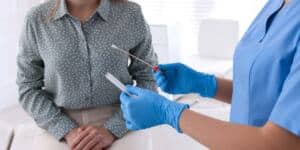How can I get chlamydia?
Chlamydia is a sexually transmitted infection (STI) caused by a bacteria, Chlamydia trachomatis (C. trachomatis). You can be infected with chlamydia during oral, vaginal, or anal sex with an infected person. Chlamydia can also be passed from mother to baby during childbirth.
How do I know if I have chlamydia?
Chlamydia typically does not have any symptoms initially. However, several weeks after having sexual intercourse with an infected partner, the following symptoms may be observed:
- Discharge from your penis
- Burning sensation when urinating
- Burning/ itching at the opening of your penis
- (less common) Pain and swelling in the testicle(s)
If chlamydia infects the rectum, it can cause:
- Rectal pain
- Rectal bleeding
How can I confirm if I have chlamydia?
If you are a sexually active person and happen to have any genital symptoms like those listed above, do refrain from having sex until you see a healthcare provider to get tested for STIs.
There are various diagnostic tests for chlamydia:
A. Nucleic Acid Amplification Tests (NAATs)
- Urine test – non-invasively collected specimens, such as first-catch[1] urine samples (FCUs) can be used to screen for chlamydia
- Swab test – a swab will be inserted into the penis to get a sample from the urethra; in other cases, your anus will be swabbed
B. Cell Culture
Cell culture for C. trachomatis involves introducing a layer of cells suspected to be infected with chlamydia into a culture medium. After 48-72 hours of growth, infected cells can be detected by staining with an antibody.
What can chlamydia lead to?
- Epididymitis (Epididymis Infection)
- Men often do not have health problems from chlamydia, but if chlamydia infects the epididymis (tube that carries the sperm), it may result in epididymitis
- May cause pain, fever, swelling at testicles, and rarely, infertility
- Reactive arthritis
- A form of arthritis that developed due to an infection in other parts of the body
- May cause severe joint pain, fever, joint redness/ swelling, and difficulty in moving the infected area
- Human Immunodeficiency Virus (HIV)/ Acquired immunodeficiency syndrome (AIDS)
- Untreated chlamydia also increases your chances of contracting/ spreading HIV and AIDS
- Prostate gland infection
- Rarely occurs as chlamydia does not spread to the prostate gland often
- May cause pain during/ after sexual intercourse, fever, burning sensation while urinating, lower back pain

How can chlamydia be cured?
Antibiotics are commonly used to treat chlamydia. If taken accurately, 95% of people with chlamydia will be cured. Doxycycline and azithromycin are the two most commonly prescribed drugs to treat chlamydia.
| Drug | Usage | Side effects | Note | When can I have sex again? |
| Doxycycline | Taken every day for a week | HeadachesNausea/ vomiting increases skin sensitivity to the sun | Not prescribed for children under 12 years old/ pregnant and breastfeeding women Do not drink alcohol while taking doxycycline | Sexual activities are not recommended (including vaginal, oral, or anal sex, even with a condom) until treatment is completed |
| Azithromycin | One dose of 1g, followed by 500 mg once a day for 2 days | Nausea/ vomitingDiarrhoeaLosing your appetiteHeadachesChanges to your sense of taste | Can be taken by adults and children | Should wait 7 days after treatment is completed before performing sexual activities |
Antibiotics can cure chlamydia infection, but cannot repair any permanent damage caused by the infection.
To prevent your partner from getting infected with chlamydia, refrain from sex until you are cured. Getting a repeat infection is common, so do get tested again about 3 months after treatment.
Chlamydia is a curable infection with antibiotics. However, if left untreated, chlamydia can cause permanent damage to the reproductive system in both men and women. If you think you may have an STI, it’s important to get tested by a healthcare provider as soon as possible.
Share this blog post with your friends and loved ones to help promote better sexual health!

